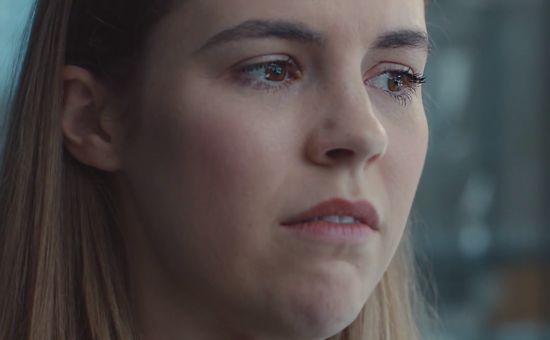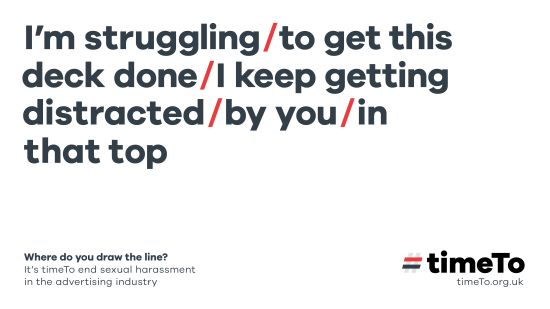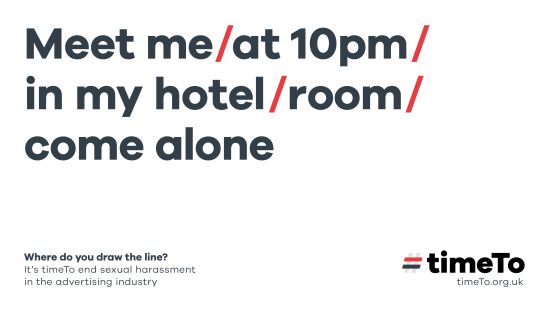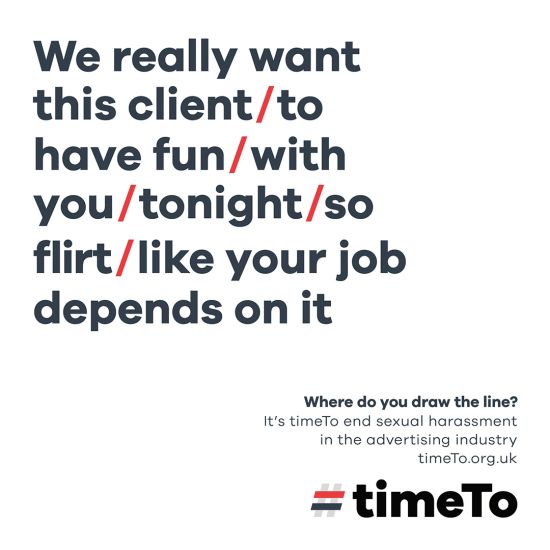
Your Shot: How timeTo Posed the ‘Perfect Question at the Perfect Time’

As soon as midnight struck on October 31st, Adland’s Christmas season kicked in. That meant an immediate flurry of fake snow and twee festive covers as the seasonal ads began to roll out. It also means that party season isn’t too far off either. In the climate of #MeToo, all but the very densest of agencies and production companies will have binned the mistletoe (we hope), but with alcohol sloshing around the risk of sexual harassment will run particularly high. In a survey published earlier in the year, booze was revealed as a significant risk factor for sexual harassment, with 20% of respondents who shared their experiences of harassment mentioning alcohol and 18% mentioning work parties.
That makes last week’s launch of the UK industry’s timeTo campaign ‘Where Do You Draw the Line?’ even more pressing. The campaign from the Advertising Association, NABS (National Advertising Benevolent Society), and WACL (the Women’s Advertising Club of London) – backed by ISBA and the IPA and the APA – encourages its audience to empathise with victims and to question their own (and their colleagues’) conduct.
The campaign strategy and creative was devised by agency Lucky Generals, with print, social and online films that depict the creep from innocent behaviour through uncomfortable weirdness to straight up intimidation and exploitation. It simply asks the viewer to consider where they draw the line with inappropriate behaviour.

When Lucky Generals presented the idea, the response from the timeTo committee was overwhelming, say Stephen Woodford and Matt Bourn at the Advertising Association. “When Helen first presented the strategy and the initial creative, our reaction was immediate – a spontaneous round of applause. You just know when creative hits the right note and our steering committee, which includes Tess Alps, Kerry Glazer and Diana Tickell, were unanimous about the power of the creative platform – where do you draw the line? It is the perfect question to pose at the perfect time.”
Their starting point was to dig into this summer’s timeTo survey of 3,500 people. According to Lucky Generals Founding Partner Helen Calcraft, the data revealed numerous viewpoints, from deniers who refuse to acknowledge a problem, ‘evolvers’ who think harassment is a thing of the past to ‘activists’ who are fighting for change. In order to catalyse a meaningful shift in the industry, they knew they had to do more than preach to the ‘activists’ – they had to engage everyone.
“Amongst these varying viewpoints, the one thing that came up time and time again, was a question of what is and isn't appropriate behaviour. This can be such a grey area,” reflects Helen. “We knew that we needed to engage all stakeholders in this issue as we cannot effect cultural change by alienating people. Telling them how to behave was never going to be an effective strategy; we needed an approach that allowed them to question their own behaviour and draw their own conclusions.”
According to the team at NABS, since launching timeTo in the summer, the charity has received calls from victims of sexual assault but also from people who are worried that their own behaviour has crossed the line. Rather than creating a division, the campaign potentially taps into and encourages that spirit of introspection and reflection - and which hopefully will result in real behaviour change.

The scenarios depicted in the campaign are based on true stories – though the agency took pains not to cross any confidentiality lines. Being pressured to flirt with a client on a pitch or finding oneself in a vulnerable situation whilst away from home are all situations that can and do happen.
But another aspect of the campaign that was handled with care by the team at Lucky Generals was to devise an approach that acknowledged that the issue is relevant to all in the industry, regardless of age, sex, ethnicity or sexuality.
Director Steve Reeves at Another Film Company helped to bring the campaign to life with a series of emotive films. These films show the faces of people as they experience sexual harassment in day-to-day interactions. Originally, the films were going to show perpetrators, but ex-agency creative Steve, who collaborated closely with the creative team at Lucky Generals, decided on a more focused approach.
“I felt that by only showing the victim's face would make the scene far more impactful than a more graphic and traditional approach to filming,” says Steve. “This uncompromising approach not only avoided seeing the perpetrator, but it also forces the viewer to really empathize with the victim.”
Together with the editor, Scot Crane at the Quarry, they decided that there would be no cuts. It’s a creative decision that doesn’t let anyone off the hook. For the viewer, it’s an unrelentingly difficult watch. And it doesn’t let potential perpetrators justify their behaviours, as Helen explains.
“We were very careful to avoid clichés and we deliberately chose not to show the face of any perpetrator, because it would be all too easy for our audience to dismiss a character as 'unrealistic' or 'not someone I recognise',” she says, praising Steve’s idea, as well as his instinct and ability to draw relatable and real performances from the actor.
The deceptively simple films are elevated by finely-tuned craft. Casting director Belinda Northcliffe dug extensively to find the right actors. “We had to be very fussy with the casting,” says Steve. “We were looking for actors that could provide a carefully nuanced performance that would largely be delivered in their eyes - which sounds a bit pretentious, but when you see the films you’ll see what I mean.”
That subtlety also extends to the sound design from Sam Robson and Jeff Smith at 750mph and the grade by Matt Turner at Absolute Post, which unobtrusively shift as the films get darker. For example, you might not pick up on it, but the actors’ eyes are sharpened towards the end of the spots, heightening the emotional impact.
Steve was aware that his audience was a potentially critical and careful bunch, so getting that tone right was vital. “The films are aimed at very sophisticated and film literate audience - the advertising community - so it was vitally important that the films are credible, without being patronising or too sensational, while getting the message across. Hopefully we’ve got the balance right.”
For Stephen Woodford and Matt Bourn at the Advertising Association, they certainly have struck the right note. “The films make for difficult, uncomfortable viewing – that was the ambition of the creative and it has been superbly achieved through a combination of directing, acting and production craft that shows just what UK advertising is capable of. No matter what the topic, our industry has the talent to make work that affects real change. Our goal is to make our industry a safe place for everyone – I know these films will play a pivotal role in helping us get closer to that target.”

And the campaign doesn’t end there. Part of the cleverness of Lucky Generals’ approach is that it’s relatively easy to evolve as the months roll by. And, given the timeTo survey found that 34% of women and 9% of men in the industry have experienced sexual harassment, there are sadly many, many potential scenarios to explore.
“The beauty of the idea, we believe, is that it's a simple structure that can be quickly rolled out to respond to different scenarios - for example we'd love to continue to adapt the campaign executions to specific events and times of year, where the line might perhaps be crossed. The survey told us that instances of harassment are higher when alcohol is involved, so we'll be running bespoke executions around Christmas parties, summer parties, and Cannes,” says Helen.
Tackling sexual harassment across the industry is not going to be an easy fix, but all involved hope that the campaign will encourage people to think about their behaviour, to empathise with their adland colleagues and to sign up to the timeTo Code of Conduct (business leaders can do so here) - and ultimately end harassment in advertising.













